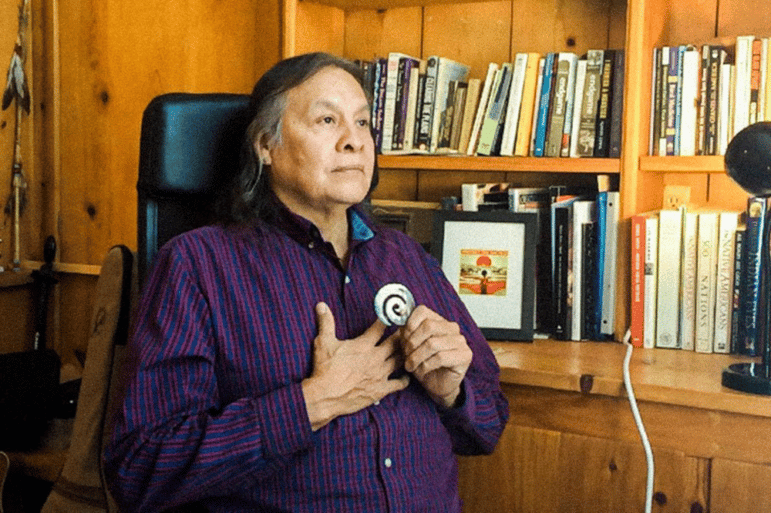
Mindahi Bastida and Tiokasin Ghosthorse join other indigenous voices contributing to National Geographic Corona Virus Coverage
Traditional indigenous beliefs are a powerful tool for understanding the pandemic
Native American spiritual leaders say this is a time to recalibrate for a better future.
Read the complete article at National Geographic online – May 12, 2020
***
‘Blood memory’
For indigenous people, history plays an unavoidable role in interpreting the pandemic. One elder from Michigan called Joseph to talk about how difficult it’s been for her to care for herself and her family. After some reflection, the woman realized why: She was weighed down by thoughts of the smallpox epidemic that had killed so many Native Americans. She felt she needed to forgive the U.S. government for intentionally giving her people the illness.
While documentary evidence that Europeans or Americans purposely spread smallpox is scarce, there’s little doubt that colonizers brought infectious diseases that killed an estimated 90 percent—some 20 million people or more—of the indigenous population in the Americas. “Even though we may not have been alive in the time of the smallpox epidemic, that’s in our blood memory,” says Joseph, “just as historical resiliency is also in our blood memory.”
Those deeply rooted experiences can lead to acceptance, especially among elders. “They have been through so much and experienced so much that there’s no need to fear or even panic,” says Tiokasin Ghosthorse, the Stoneridge, New York-based host of First Voices Radio and a member of the Cheyenne River Lakota Nation from South Dakota. “It’s almost like this [pandemic] is familiar.”
As such, indigenous communities aren’t dwelling on the pandemic’s backstory. “Indigenous peoples don’t always need to go and explain what happened, why it happened,” says the Reverend David Wilson, a Methodist minister in Oklahoma City and member of the Choctaw Nation. “We just know it’s there.”
“We’re taught not to think of nature as separate,” explains Ghosthorse, and that includes COVID-19. “The coronavirus is a being,” he says. “And we have to respect that being in an ‘awe state’ and a ‘wonder state’ because it has come to us as a medicine” to treat spiritual ills.
Lessons for the future
While this pandemic is presenting an opportunity to find meaningful ways to connect, it’s also a wake-up call with important lessons for the future. “If we don’t learn from now,” warns Mindahi Bastida Muñoz, general coordinator of the Otomi-Toltec Regional Council in Mexico, “then another thing, more powerful, is going to come.”
Bastida, who is also the director of the Original Caretakers program at the Center for Earth Ethics in New York City, says the world is out of balance and that anthropocentrism—our human-centric outlook—is the cause. “We think that we are the ones who can decide everything,” he says, “but we are killing ourselves.”
It doesn’t matter where the coronavirus came from, says Mindahi Bastida Muñoz, a member of the Otomi and Tolteca people in Mexico who is sheltering with friends in Granville
… Read More PHOTOGRAPH BY JOSUÉ RIVAS, NATIONAL GEOGRAPHIC
“Mother Earth is saying, ‘please listen,’” adds Joyce Bryant, known as Grandmother Sasa, the Abenaki founder of a healing center in New Hampshire. “We have to care about others. You know, the grass, the trees, the plants, the air, the water—all are extensions of ourselves. And they teach us.”
“Living in harmony with Mother Earth is a lot of work,” says Bastida, but it can be done by reviving the indigenous idea that humans serve as caregivers of nature. He’s working with spiritual leaders across the world to return to the old ways—producing food by hand, finding medicine in plants, animals, and minerals, and performing rituals and ceremonies that send prayers to Mother Earth.
Perhaps the biggest lesson that indigenous spiritual leaders hope people will take from the pandemic is that it’s a time to be still, to reflect, and to listen to elders. Both Joseph and Wilson likened this period of stay-at-home orders to a long winter, when people would traditionally stay inside and listen to stories. According to Joseph, it’s like Earth is saying “not today, humans, you need some more reflection.”
